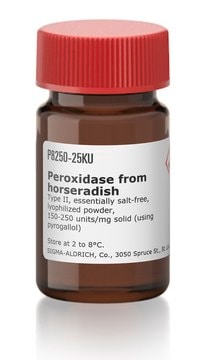A4108
Aminophenyl fluorescein solution
5 mM in DMF, suitable for fluorescence
Synonym(s):
2-[6-(4′-amino)phenoxy-3H-xanthen-3-on-9-yl]benzoic acid solution, APF solution
Sign Into View Organizational & Contract Pricing
All Photos(1)
About This Item
Recommended Products
form
liquid
Quality Level
concentration
5 mM in DMF
suitability
suitable for fluorescence
storage temp.
2-8°C
Related Categories
General description
Aminophenyl fluorescein solution, also known as APF, is a novel fluorescent probe. APF exists as a non-fluorescent entity, which converts to its fluorescent form called fluorescein upon oxidation. The excitation length is at 488nm, and the emission spectrum is monitored between 495-600nm and measured using flow cytometry.
Fluorescence intensity increases after reaction with hROS (e.g. hydroxy radical, peroxynitrite and hypochlorite). And, APF is resistant to light-induced autoxidation.
Fluorescence intensity increases after reaction with hROS (e.g. hydroxy radical, peroxynitrite and hypochlorite). And, APF is resistant to light-induced autoxidation.
Application
Aminophenyl fluorescein solution is a suitable tool to detect hypobromous acid (HOBr) produced in eosinophils. It is used to detect the halogenating activity of heme peroxidases in leukocytes. APF does not react with nitric oxide, superoxide, and hydrogen peroxide; hence, it can be used to detect peroxynitrite differentially.
Fluorescent detector of highly reactive oxygen species (hROS). Fluorescence intensity increases after reaction with hROS (e.g. hydroxy radical, peroxynitrite and hypochlorite). Since APF does not react with nitric oxide, superoxide, and hydrogen peroxide, it can be used to differentially detect peroxynitrite. APF is resistant to light-induced autoxidation.
Signal Word
Danger
Hazard Statements
Precautionary Statements
Hazard Classifications
Acute Tox. 4 Dermal - Acute Tox. 4 Inhalation - Eye Irrit. 2 - Flam. Liq. 3 - Repr. 1B
Storage Class Code
3 - Flammable liquids
WGK
WGK 2
Flash Point(F)
135.5 °F - closed cup
Flash Point(C)
57.5 °C - closed cup
Personal Protective Equipment
dust mask type N95 (US), Eyeshields, Gloves
Certificates of Analysis (COA)
Search for Certificates of Analysis (COA) by entering the products Lot/Batch Number. Lot and Batch Numbers can be found on a product’s label following the words ‘Lot’ or ‘Batch’.
Already Own This Product?
Find documentation for the products that you have recently purchased in the Document Library.
Customers Also Viewed
Detection of the halogenating activity of heme peroxidases in leukocytes by aminophenyl fluorescein.
J Flemmig et al.
Free radical research, 49(6), 768-776 (2014-12-24)
The formation of hypochlorous and hypobromous acids by heme peroxidases is a key property of certain immune cells. These products are not only involved in defense against pathogenic microorganisms and in regulation of inflammatory processes, but contribute also to tissue
Jörg Flemmig et al.
The Journal of biological chemistry, 287(33), 27913-27923 (2012-06-22)
The specific detection of peroxidase activity in human granulocytes is essential to elucidate their role in innate immune responses, immune regulation, and inflammatory diseases. The halogenating activity of myeloperoxidase in neutrophils can be determined by the novel fluorescent probe aminophenyl
Our team of scientists has experience in all areas of research including Life Science, Material Science, Chemical Synthesis, Chromatography, Analytical and many others.
Contact Technical Service












